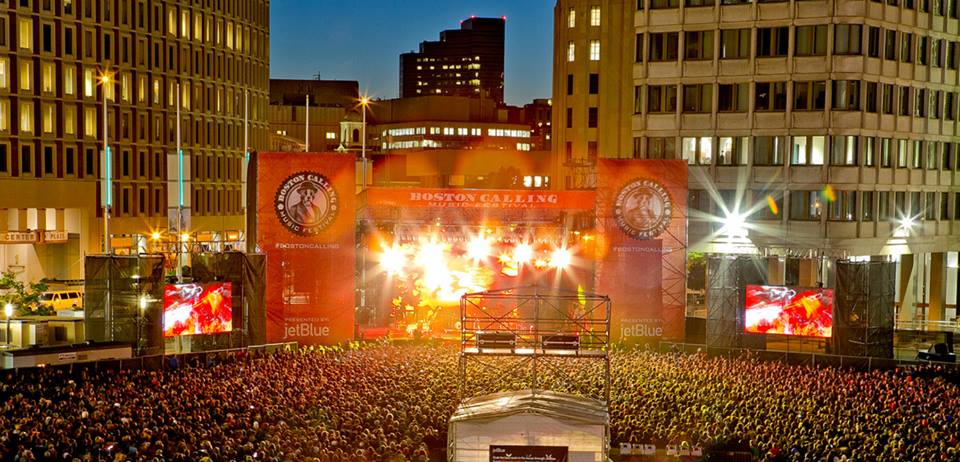By Galen Chuang ’17
Co-Arts Editor

New York City has Governors Ball, Chicago has Lollapalooza and Indio, Calif. has Coachella. Since its first installment in May 2013, Boston Calling has been Boston’s equivalent large summer music festival. Occurring over one weekend in May and one in September each year, the festival, split across two stages at City Hall Plaza, has an expected attendance of 22,000 people each day. This is small compared to similar music festivals in other large cities, but larger than any other music event of its kind in Boston. Boston Calling books about twenty artists each weekend, with well-known past headliners such as fun., Vampire Weekend, Passion Pit and Jack Johnson.
This year, the festival takes place on Sept. 5, 6 and 7. Headliners include The National, Lorde, The Replacements, NAS x The Roots, Neutral Milk Hotel and Childish Gambino. New this year, the festival will also include Sam Adams’ OctoberFest celebration, lawn games and monitors displaying sporting events.
The Wellesley News spoke over the phone with Brian Appel, co-founder of Boston Calling, about booking artists, local bands, and future plans for the festival.
The Wellesley News: How did you start Boston Calling, and what were your initial goals for the festival?
Brian Appel: My partner and I were working on a festival concept when we were at WFNX radio in 2011, and we thought it would be a good opportunity to start a new festival in downtown Boston. When WFNX stopped broadcasting in 2012, we decided to further explore the concept on our own. Our initial goal was to build a twice-a-year festival, with two days per festival, and charge a reasonable ticket price. We wanted to make it as easy as possible for people and families to come down and enjoy music in downtown Boston.
How do you choose which artists to book?
We have a booking team that curates the festival. Aaron Dessner, the guitarist and songwriter for the band The National, is part of our curating team. We spend a lot of time both on email and on conference calls, talking about which bands look good, and the headliners for the next festival and for two festivals away. With the way the industry is set up, so many bands are making plans up to a year in advance that we need to be far in advance with our booking.
Is there a number of local bands that you try to book?
Yes, we always reserve at least two spots on the bill for Boston area bands so we can showcase and highlight the greater Boston area. Additionally, we run block parties in Dewey Square Park all summer long, every Thursday evening. Those are exclusively Boston area bands.
What are some local bands you’re personally excited for?
We’ve liked Gentleman Hall for a long time. When we worked at WFNX, we used to work with them, so we’re excited to see them. And CliffLight is getting a lot of attention as well, so we’re happy we booked them a couple of months ago.

How is this September going to be different from previous Boston Calling installments?
Sam Adams is bringing their OctoberFest celebration, so we’ll have a bunch of OctoberFest themed beers onsite and entertainment that goes along with OctoberFest. We’ve also created a lawn game area where people can come and play different games. We’ll have TV screens broadcasting sporting events. So we’re really trying to make it so that you can come and explore different things throughout the weekend if you want to take a break from the music.
What are some things about Boston Calling you’d like to improve for the future?
We’re always working on layout and making sure it’s the best flow for people on the site. Currently, there’s some construction happening at the Government Center T station, which is part of our site, and we hope that that gets wrapped up in a year or so. Once that opens up, we think we’ll get a lot more real estate we can play around with to create more space. At the moment, we are not looking to add more performance areas. With more space, we would likely enhance the audience area to give attendees more room to roam and relax.
Why did you choose the format of non-overlapping set times across two stages?
From an attending standpoint, it’s really nice because if you’re really into every band, you can see every band and never miss a song. The stages are close enough together that as soon as one band ends, another one begins. It’s also nice for the bands themselves, because they often play festivals around the world, and festivals much bigger than us have six or more stages. Bands feel like they’re competing for the audience, or there might be something else going on to distract the audience. But if they come and play at Boston Calling, they’ve got the undivided attention of the audience.
Any tips for concertgoers at Boston Calling this year?
Our recommendation is always to come down early and make sure you don’t miss out on the local bands that are earlier in the day. We try to curate an undercard of up-and-coming bands that go on, many times, from 12:30 to 3:00 p.m. Feel free to leave if you want to take a little break from the festival, go across the street to Faneuil Hall, get some food, then come on back. It’s a long day, so whatever you need to do to stay energized is fine.









